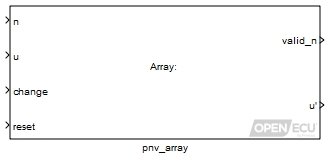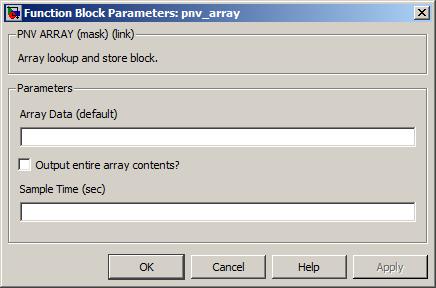Adaptive array non-volatile storage.
None (Main library). (See Section 2.3, “Licensed Features”.)

Sets outport u' to the value of the adapted array indexed by inport n. Before outport u is set, the value of indexed adapted array can be changed to inport u.
The target non-volatile memory is provided in two ways: either through storage that requires an external power source when the ECU is powered down (battery backed RAM storage), or not (Flash storage). See the technical specification for details on which storage type is supported by each target.
The battery backed non-volatile memory requires a small amount of power overall, i.e., much less than powering the ECU normally.
The adaptive data is check-summed using a 16-bit CRC. Failure to match the check-sums on start-up means that the data cannot be recovered. In this case, or if the model is simulated, adaptive data is reverted to the default value specified when the model was built.
The nth element in the array to modify.
Range: [0, number of elements in array - 1]
Value type: Integer Calibratable: No The value to write to the nth element of the array. The type of this inport is the same as the type of the parameter Array Data (default).
Value type: Real Calibratable: No 1 if the nth element of the array should be change to inport u, 0 otherwise. If the inport reset is 1, no change will occur (even if inport change is 1).
Range: 0 or 1
Value type: Boolean Calibratable: No 1 to change the array to the values of the Array Data (default) parameter, 0 otherwise.
Range: 0 or 1
Value type: Boolean Calibratable: No
1 if inport n refers to an element in the array, 0 if inport n is larger than the number of array elements.
Value type: Boolean Calibratable: No The value of the nth element of the array, possibly after the array has been changed. The type of this outport is the same as the type of the parameter Array Data (default).
Value type: Real Calibratable: No The current values of all elements of the array, possibly after the array has been changed, output as a vector. The type of this outport is the same as the type of the parameter Array Data (default). This outport is only present when the Output entire array contents? mask parameter checkbox is ticked.
Value type: Dynamically Typed Calibratable: No

The name of the DDE for the array (e.g.
vftv_array, see Section "Naming rules"). An array can contain one or more elements. The type of the array dictates the type of inport u and outport u'.Value type: Real Calibratable: Yes, offline and online Tick this checkbox to create an outport from the block to output the entire array contents.
Value type: Boolean Calibratable: No The periodicity of the block execution.
Range: [0.001, 3600] seconds
Value type: Real Calibratable: No
The build process generates a corresponding ASAP2 entry to the adaptive parameter that can be accessed via a calibration tool. The name of this entry has a fifth character 'a', i.e., given the default parameter name
vtfv_array, an ASAP2 entry with namevtfva_arrayis generated. Note that this implies that only a single adaptive parameter can exist per named default parameter.Warning
If two or more blocks refer to the same named item in the Array Data (default) field, these blocks will independently adapt the same adaptive parameter.